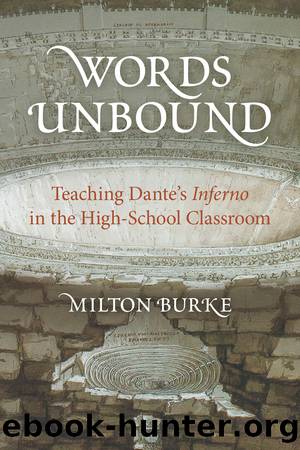Words Unbound by Milton Burke

Author:Milton Burke [Burke, Milton]
Language: eng
Format: epub
ISBN: 9781610756136
Publisher: University of Arkansas Press
After he turned back he seemed like one
who races for the green cloth on the plain
beyond Verona. And he looked more the winner
than the one who trails the field.
The double use of the verb parve (âseemedâ: the Hollanders unhelpfully translate the second occurrence as âlookedâ) can express both the pilgrimâs admiring view of Brunetto in the narrative past and the poetâs implicit reservations about him now. The pilgrim thought him a winner, but that was only seeming, as the poetâs scorching placement of him in hell suggests.
I hope these details and others you can draw from canto 15 support the case Iâd like to make about the poetâs intentions. Dante is never a single-valence poet. Throughout the Commedia, he is interested in the proportions of whole human lives. In Inferno, this produces pictures of how some uncontrolled human leanings can disfigure and finally destroy whole personalities. Brunettoâs âscorched faceâ when Dante meets him is the very image of that disfigurement of a once-revered countenance. Then Dante would be concerned not as much with a characterâs specific sinful actions as with the disposition that dominates his life. Not just the act of suicide but the mind of a light denier. Not just a self-centered heresy but the fundamental denial of basic human communion. And so on.
Iâve been claiming that the theme in this canto is procreativity as applied to father figures. It judges how those in a paternal position discharged that responsibility. Allegorically, the canto would then deal with the parental faculty in every human soul, that part of us that responds to the call to subordinate our own interests to those of others depending on us for nurture or guidance. You have been in that position when you raised kids, guided any subordinate or follower, taught students in a high-school classroom, or acted as anyoneâs role model. Itâs a responsibility everyone has to assume at some time or other. A metaphorical sodomite fulfills his parental duty negligently, narcissistically, or otherwise detrimentally so as to produce nothing healthy from interaction with people whose welfare depends on him. This creates a desert where there should be flora.
For this interpretation to hang together, youâd expect the other desert runners in this canto to be in Brunettoâs category: eminent people positioned in life to influence younger minds. And that, according to Brunetto, is what you do find: bands comprised entirely of âclerics or great and famous scholars.â Brunetto mentions three particular companions, Francesco dâAccorso, Priscian, and Andrea deâ Mozzi. All three were renowned in their day, and as with Brunetto, none is characterized as homosexual in any other source. So maybe specific homosexual acts are not the point, or not the main point. Dante may consider homosexuality as naturally correlated with unproductive parenthood, but on the logic here, it would be a supporting condition and not a necessary cause. You could take it away and still have something deplorable, and you could find it present in something good. Then you could find non-literal sodomites in this canto and unrepentant homosexuals in purgatory or paradise.
Download
This site does not store any files on its server. We only index and link to content provided by other sites. Please contact the content providers to delete copyright contents if any and email us, we'll remove relevant links or contents immediately.
| Arts & Humanities | Health |
| Language Arts | Library Skills |
| Mathematics | Reading & Phonics |
| Science & Technology | Social Studies |
The Art of Coaching Workbook by Elena Aguilar(51137)
Trainspotting by Irvine Welsh(21608)
Twilight of the Idols With the Antichrist and Ecce Homo by Friedrich Nietzsche(18602)
Fangirl by Rainbow Rowell(9213)
Periodization Training for Sports by Tudor Bompa(8237)
Change Your Questions, Change Your Life by Marilee Adams(7718)
This Is How You Lose Her by Junot Diaz(6857)
Asking the Right Questions: A Guide to Critical Thinking by M. Neil Browne & Stuart M. Keeley(5741)
Grit by Angela Duckworth(5576)
Red Sparrow by Jason Matthews(5450)
Paper Towns by Green John(5163)
Room 212 by Kate Stewart(5091)
Ken Follett - World without end by Ken Follett(4705)
Housekeeping by Marilynne Robinson(4420)
The Sports Rules Book by Human Kinetics(4367)
Double Down (Diary of a Wimpy Kid Book 11) by Jeff Kinney(4252)
Papillon (English) by Henri Charrière(4238)
The Motorcycle Diaries by Ernesto Che Guevara(4069)
Exercise Technique Manual for Resistance Training by National Strength & Conditioning Association(4048)
